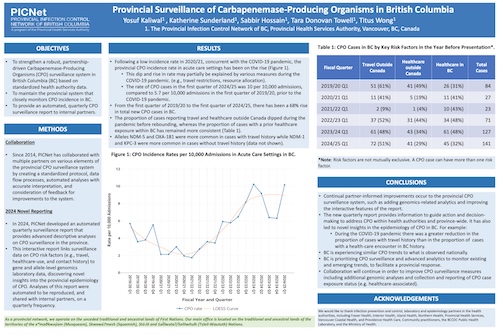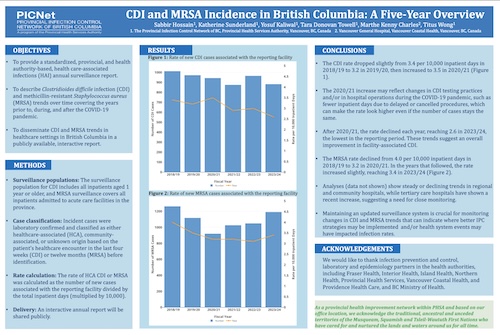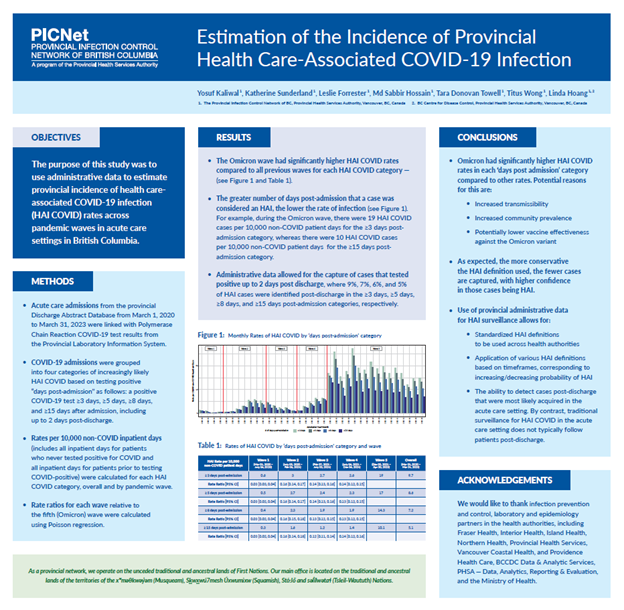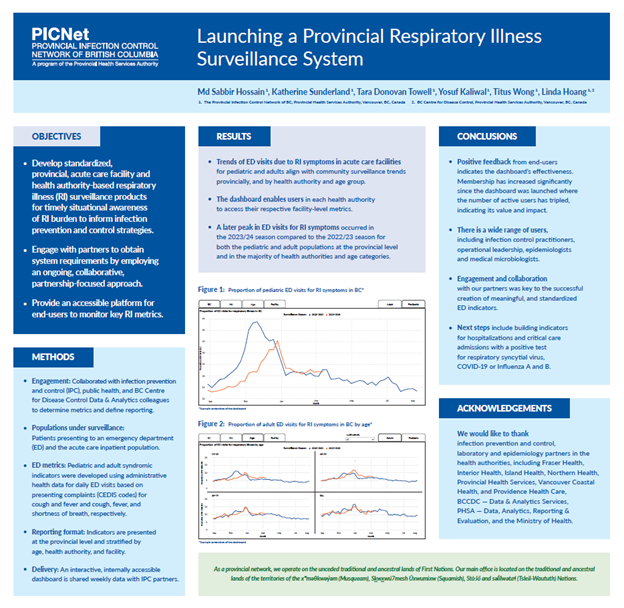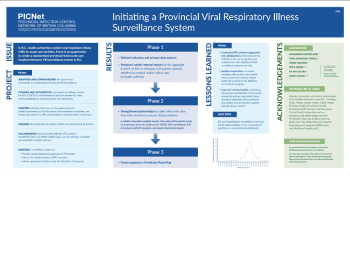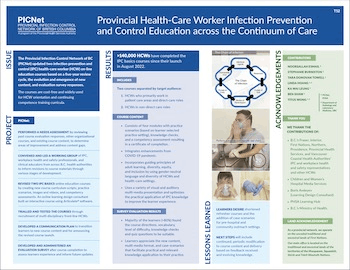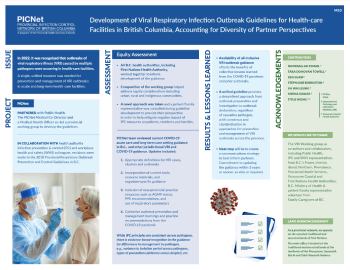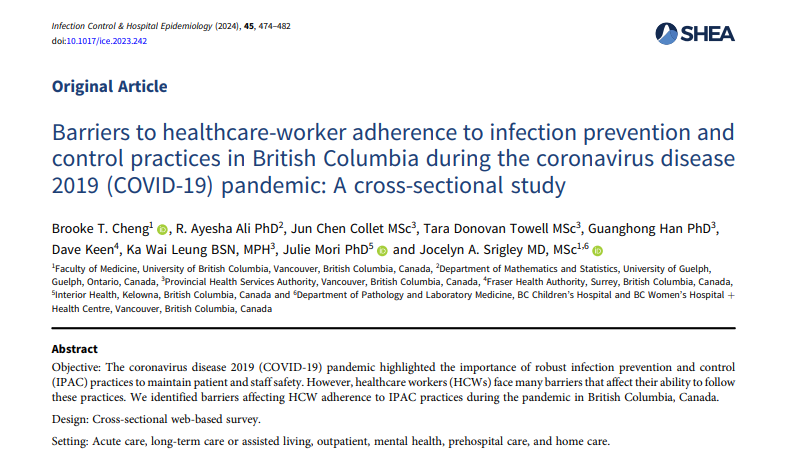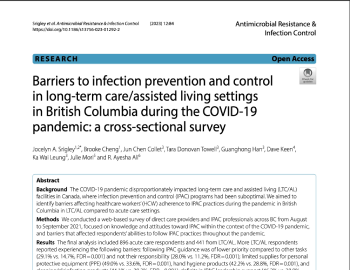PICNet Posters
Provincial Surveillance of Carbapenemase-Producing Organisms in British Columbia
IPAC Canada Conference (Winnipeg)
Date: June 2025
Objective: To maintain the provincial system that closely monitors CPO incidence in BC and to provide an automated, quarterly CPO surveillance report to internal partners.
Key Findings:
• There has been a 68% rise in new CPO cases in BC from Q1 2019/20 to Q1 2024/25.
• While cases reporting travel and healthcare outside Canada dipped during the pandemic before rebounding, cases with BC healthcare exposures have been more consistent.
• NDM-5 and OXA-181 alleles were more common in cases with travel history; NDM-1 and KPC-3 were more common in cases without travel history.
Conclusion: Partner-informed improvements, such as adding genomics-related analytics and improving the interactive features of the report are ongoing. The new quarterly report has led to novel insights in the epidemiology of CPO in BC.
CDI and MRSA Incidence in British Columbia: A Five-Year Overview
IPAC Canada Conference (Winnipeg)
Date: June 2025
Objective: To describe CDI and MRSA trends over time covering the years prior to, during, and after the COVID-19 pandemic and to disseminate these findings in a publicly available interactive report.
Key Findings:
• Overall, the CDI rate dropped throughout the reporting period, with a slight rise in 2020/21, possibly reflecting changes in CDI testing practices and/or in hospital operations during the COVID-19 pandemic.
• The MRSA rate declined from 2018/19 to 2022/23. The rate has increased slightly in 2023/24.
Conclusion: Maintaining an updated surveillance system is crucial for monitoring changes in CDI and MRSA trends that can indicate where better IPC strategies may be implemented and/or health system events may have impacted infection rates.
Estimation of the Incidence of Provincial Health Care-Associated COVID-19 Infection
AMMI Canada – CACMID Annual Conference (Vancouver)
Date: April 2024
Objective: The purpose of this study was to use administrative data to estimate provincial incidence of health care associated COVID-19 infection (HAI COVID) rates across pandemic waves in acute care settings in British Columbia.
Key Findings:
• The Omicron wave had significantly higher HAI COVID rates for each HAI COVID category, compared to all previous waves.
• The more conservative the HAI definition used, the fewer cases are captured, with higher confidence in those cases being HAI.
• Administrative data allowed for the capture of cases that tested positive post discharge.
Conclusion: Omicron had significantly higher HAI COVID rates in each HAI COVID category compared to other waves. In addition, the use of provincial administrative data for HAI surveillance allows for standardized HAI definitions to be used across health authorities, and for the ability to detect cases post-discharge that were most likely acquired in the acute care setting.
Launching a Provincial Respiratory Illness Surveillance System
AMMI Canada – CACMID Annual Conference (Vancouver)
Date: April 2024
Objectives:
• To create a standardized, provincial respiratory illness (RI) acute care surveillance system to monitor key metrics and support infection prevention and control (IPC) strategies.
• To provide an interactive, weekly dashboard, shared internally with infection prevention and control partners, stratified by age, health authority, and facility.
Key Findings:
• Provincial Emergency Department (ED) visit trends for RI symptoms mirrored community surveillance across seasons, health authorities, and age categories.
• The 2023/24 season exhibited a delayed peak in both pediatric and adult ED visits compared to 2022/23.
• Active dashboard users tripled since the launch, with positive feedback from IPC practitioners, epidemiologists, operational leaders, and microbiologists.
Conclusion: Strong cross-sector engagement produced a robust RI dashboard. Future plans include hospital and ICU metrics to expand situational awareness.
Initiating a Provincial VRI Surveillance System
IPAC Canada Conference (Vancouver)
Date: May 2023
Provincial HCW IPC Education across the Continuum of Care
IPAC Canada Conference (Vancouver)
Date: May 2023
Objective: To outline the process and learnings for developing two provincial online infection prevention and control (IPC) basics courses for health care workers
Key Findings:
• Course content updated and enhanced based on COVID-19 pandemic learnings and engagement with health authority partners and subject matter experts.
• Learners appreciated multi-media format, and case-scenarios that facilitate practical and relevant knowledge application to their practice.
• Future course enhancements include a shortened refresher course and the addition of case scenarios for pre-hospital and community outreach settings.
Conclusions: Engagement of relevant partners, COVID-19 pandemic learnings, use of multi-media format, and using the principals of adult education can enhance IPC educational courses.
Development of VRI Outbreak Guidelines for Health Care Facilities in BC
IPAC Canada Conference (Vancouver)
Date: May 2023
Objective: To outline the necessity and process in developing unified provincial viral respiratory illness outbreak (IPC) guidelines across different settings and regional contexts.
Key Findings:
• Engagement with key partners including public health, health authority IPC, and patient representatives were essential to achieving consensus and standardization in approaches for prevention and management of VRI outbreaks across the province.
• A unified and all-inclusive VRI outbreak guidelines affords the benefits of collective lessons learned from the COVID-19 pandemic and prior outbreaks and allows a streamlined approach from outbreak preparation and investigation to outbreak declaration, regardless of causative pathogen.
Conclusion: Collaboration with key partners is essential in deriving a provincial approach to an all encompassing and streamlined VRI outbreak guidance.
PICNet Publications
Barriers to healthcare-worker adherence to infection prevention and control practices in British Columbia during the coronavirus disease 2019 (COVID-19) pandemic: A cross-sectional study
Date: November 2023
Objective: To identify barriers to adherence to infection prevention and control (IPAC) practices by healthcare workers (HCWs) in BC during the COVID-19 pandemic.
Key Findings:
• Among HCWs not working directly in IPAC programs, overall attitudes toward IPAC practices were positive.
• Majority of HCWs believed that IPAC practices prevent transmission in the workplace, are a priority compared to other work tasks, and are their responsibility to implement.
• The primary reported barriers to IPAC adherence among HCWs included inadequate staffing, multibed patient rooms, limited space in staff-dedicated locations, and lack of training.
• Communication about IPAC practices in the workplace and frequent changes to IPAC guidance were confusing to staff.
• Limited access to PPE and hand hygiene supplies were reported as barriers to adhering to IPAC practices.
Conclusion: The research sheds light on HCW perspectives on the obstacles of adhering to IPAC practices during the pandemic. Ideally the findings will inform IPAC interventions for future emerging infections in BC.
Barriers to infection prevention and control in long-term care/assisted living settings in BC during the COVID-19 pandemic: A cross-sectional survey
Date: August 2023
Objective: To identify the challenges related to following IPAC measures among HCWs in BC’s LTC and assisted living (AL) facilities during the COVID-19 pandemic.
Key Findings:
• Among HCWs who are not part of IPAC programs, perceptions of IPAC practices were generally positive, with majority assuming they prevent transmission in the workplace.
• HCWs in LTC/AL often felt that following IPAC guidelines was a lower priority compared to other tasks and not necessarily their responsibility.
• Many LTC/AL staff reported having limited access to PPE, hand hygiene products, and cleaning supplies.
• There was a notable lack of IPAC leadership support and training in LTC/AL settings .
Conclusion: HCW perceptions of their ability to adhere to IPAC practices in LTC/AL can inform policy and guideline development when addressing future emerging infections in health care facilities.

